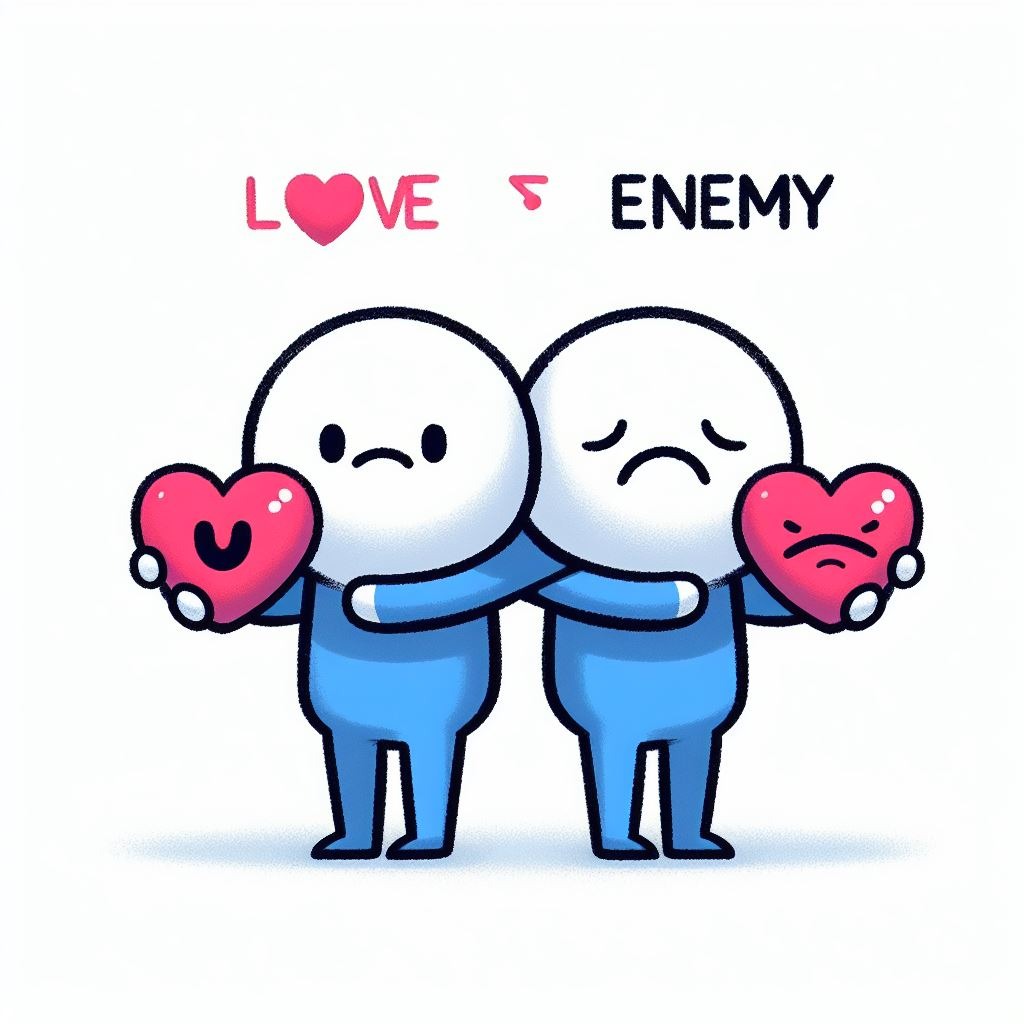“It’s simple to be kind to those who are kind to us. But to extend kindness to those who view themselves as our enemies is the epitome of genuine spirituality. Everything else is just transactional.” – Gandhi
Regardless of your religious beliefs, there’s wisdom in the teachings of Jesus that warrants reflection for anyone striving to be a better individual: his call for us to love our enemies.
Not merely “Love Thy Neighbor,” which can itself be daunting.
But “Love your enemies.” It’s a profound directive and, as it turns out, one of life’s greatest trials.
Why is this message significant, even for those not aligned with Christianity? I’m not here to delve into Christian doctrine, but to address universal challenges encountered by every human being, irrespective of their faith or lack thereof. This is a universal dilemma: the animosity we harbor towards others, animosity that simmers within us and leads to harmful actions, directed at individuals who may have wronged us but are ultimately fellow members of society whom we must coexist with.
Moreover, this concept was espoused not only by Christ but also by Buddha, Gandhi, and numerous other influential figures and belief systems.
If this still sounds lofty or preachy, let’s bring it down to a practical level: Is there someone in your life whom you despise or simply cannot tolerate? Perhaps someone who continually irks you, eliciting resentment and bitterness? And if so, does this bring you satisfaction? Does it contribute to your happiness?
I would venture to say that most of us have encountered such individuals, perhaps multiple times, who evoke anger, hatred, or at least resentment due to past grievances. I would also argue that the anger, hatred, and resentment dwelling within us are detrimental and counterproductive.
If you’re interested, let’s delve deeper into these concepts.
What Does “Love Your Enemy” Entail?
The concept is fairly straightforward, but let’s clarify it nonetheless.
“Your enemy” doesn’t exclusively refer to national adversaries; rather, it encompasses individuals whom you strongly dislike in any context.
Who might these people be? They could be bullies, those who have belittled or disrespected you, individuals with whom you hold grudges, family members with whom you’ve had heated conflicts, or those who have committed grievous acts against loved ones, ranging from physical harm to emotional trauma. They could also be authority figures such as teachers, coworkers, or bosses who mistreat you.
And what does it mean to love these individuals? Naturally, it’s a non-romantic form of love, but there are various manifestations of non-romantic love. There’s the love you feel for your children, siblings, parents, or best friends — each unique in its own right. Then there’s the love you harbor for someone who has done a kindness for you or others, whether an acquaintance or a stranger. There’s also the love you may feel for a child you’ve never met but whose plight touches your heart. Lastly, there’s the love for humanity as a whole — and this is the love in question.
Have you ever experienced a non-sexual, non-romantic love for someone outside your immediate circle? Perhaps they performed a selfless act, or you’re simply feeling a profound appreciation for humanity at the moment. Maybe you’ve encountered an extraordinary individual who inspires or uplifts others through their actions or volunteerism.
To “Love Your Enemy” means finding the capacity in your heart to set aside grievances and regard them with love as fellow human beings. It doesn’t necessitate loving them as you do your family or closest friends; rather, it involves cultivating compassionate sentiments toward them and, if feasible, expressing this through kind words, gestures, or a smile.
Admittedly, it’s not an easy task. Try envisioning the person you dislike most and see if it comes naturally to extend love toward them.
Consider someone who has caused immense pain, such as the murderer of a loved one. Such an individual undoubtedly qualifies as an “enemy.” Could you summon the compassion to love them? For many, myself included, this would pose an immense challenge, prompting the question: “Why should I bother?”
Why Should You Love Your Enemy?
While this notion may seem overly sentimental to some, it’s understandable if it doesn’t resonate with everyone. However, let’s briefly explore a few compelling reasons why it’s worth considering:
- Enhanced Happiness: Holding onto anger or resentment, even if it’s not at the forefront of your mind, can affect your overall happiness. It’s corrosive internally, eating away at your well-being, and can manifest outwardly in destructive behaviors. Furthermore, this anger can impact those around you, including loved ones, even if it’s not directed at them. Letting go of this negativity can lead to greater overall happiness.
- Potential to Impact Their Life: Your “enemy” is also a human being, and your animosity toward them might be a source of grief or tension for them. While it might provide a fleeting sense of vindication, objectively speaking, causing harm to another person is never beneficial. Bringing positivity into their life can have a transformative effect, and interestingly, contributing to someone else’s happiness often brings joy to oneself.
- Possibility of Friendship: One of the most profound outcomes of learning to love your enemy is the potential for them to become a friend. While maintaining enmity is counterproductive, forging new friendships can be immensely beneficial. A new friend can provide support and assistance, leading to personal growth and achievement. Reconciliation with a former enemy, especially if they’re a family member or former friend, can be profoundly meaningful.
- Setting a Positive Example: Our actions serve as examples for those around us, particularly for children who absorb everything we do. Teaching them to harbor hatred is detrimental, but demonstrating forgiveness and reconciliation sets a powerful example. Overcoming animosity and learning to love demonstrates resilience and compassion, qualities that benefit society as a whole.
- Beneficial for Society: While it may seem insignificant on an individual level, fostering love instead of hatred contributes to a more cohesive and harmonious society. Hatred breeds division and animosity, permeating various aspects of society, from media and politics to familial relationships. Conversely, promoting love and reconciliation fosters unity and cooperation, leading to a more peaceful and prosperous society.
- Personal Growth Challenge: Viewing the ability to love one’s enemies as a personal challenge underscores one’s character. While it’s relatively easy to extend love to family and friends, doing so toward those who have wronged us presents a true test of character. It’s a lifelong endeavor that reflects one’s commitment to growth and moral integrity.
In the words of Martin Luther King Jr., “Love is the only force capable of transforming an enemy into a friend.”
12 Tips For Loving Your Enemy
- Pause and Detach: When feelings of anger or resentment arise, pause and acknowledge them. Take a step back and detach yourself from the situation. Imagine yourself as an objective observer looking down on the circumstance.
- Empathize: Put yourself in your enemy’s shoes. Try to understand their perspective, upbringing, and motivations. Humanize them by recognizing their complexity as individuals.
- Seek Understanding: Strive to comprehend why your enemy acted as they did. Understanding their reasoning can foster empathy and pave the way for forgiveness.
- Practice Acceptance: Instead of resisting what has transpired or who your enemy is, accept them and the situation as part of life’s imperfect tapestry. Embrace the reality of what has occurred and who they are.
- Forgive and Release: Forgiveness is a challenging but essential step in the process. Let go of lingering resentment and grievances. Recognize that dwelling on the past serves no purpose and only weighs you down.
- Find Something to Appreciate: Look for redeeming qualities or admirable traits in your enemy. Focus on positive aspects, whether it’s their kindness, resilience, or unique qualities.
- Humanize Them: If finding something to love feels daunting, imagine them as a reflection of yourself or someone you care about. Recognizing their humanity can soften your heart towards them.
- Practice Gratitude: Cultivate a sense of gratitude for the lessons learned from your interactions with your enemy. Reflect on how these experiences have contributed to your personal growth and resilience. Gratitude can help shift your perspective from resentment to appreciation.
- Discover Common Ground: Identify shared interests, experiences, or traits that connect you to your enemy. Finding commonality can foster empathy and understanding.
- Open Your Heart: Challenge yourself to break down emotional barriers and open your heart, even if it feels vulnerable. Embracing vulnerability is essential for cultivating genuine love and connection.
- Extend Kindness: Take proactive steps to express your newfound love and compassion. This could involve initiating dialogue, offering compliments, performing acts of kindness, or simply sharing a smile.
- Set Boundaries: While striving to love your enemy, it’s important to maintain healthy boundaries to protect your well-being. Establish clear boundaries to safeguard yourself from further harm or manipulation, while still fostering compassion and understanding. Boundaries can create a sense of safety and empowerment as you navigate challenging relationships.
Remember, the journey toward loving your enemy is a gradual process that requires patience, self-reflection, and continual effort. Each step taken brings you closer to experiencing the transformative power of love and forgiveness.
Read Also:
- Prioritize Your Eye Health by Using These 8 Essential Daily Practices
- Useful Health Tips To Avoid Diabetes
📍 SEO & Content Strategist | Expert in Current Affairs, History, Geography & Education Blogs | Digital Marketing Specialist
Muhammad Talha Mehmood is a seasoned digital marketing specialist, SEO expert, and content strategist with over six years of experience in creating high-impact, research-driven content. As the driving force behind Globaleak.com, he delivers in-depth articles on current affairs, history, geography, and education, helping readers stay informed with accurate, well-researched insights.
🔹 Expertise & Achievements:
✔ SEO & Content Strategy: Specializes in creating authoritative, high-ranking content that aligns with Google’s EEAT guidelines.
✔ Research & Analysis: Covers historical events, geopolitical trends, and educational topics with in-depth research and expert insights.
✔ Proven Track Record: Has successfully worked with global clients, delivering content that enhances brand trust, audience engagement, and search rankings.
✔ Academic Excellence: Holds an MBA in Marketing from IBA, University of the Punjab, and a B.Com (Hons) from Hailey College of Commerce.
✔ Industry Experience: Started his career with Packages Limited, trained under PITB’s E-Rozgar Program, and later became a Team Leader & Trainer at Emenac Group of Companies.
🚀 Passionate about creating impactful content, Muhammad Talha ensures every article is insightful, engaging, and value-driven.
📧 Email: talhamehmood34@gmail.com
🔗 LinkedIn: linkedin.com/in/talhamehmood-34










